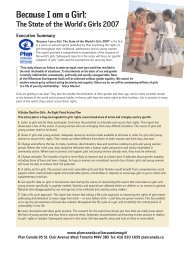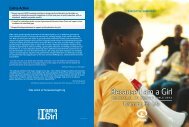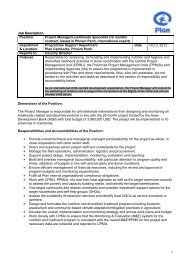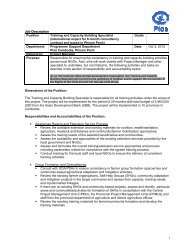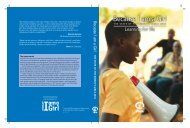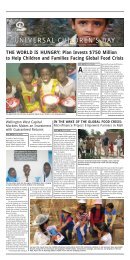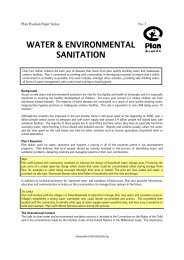Plan Worldwide Annual Review and Combined Financial ...
Plan Worldwide Annual Review and Combined Financial ...
Plan Worldwide Annual Review and Combined Financial ...
You also want an ePaper? Increase the reach of your titles
YUMPU automatically turns print PDFs into web optimized ePapers that Google loves.
7. <strong>Financial</strong> risk management<br />
<strong>Plan</strong>’s activities expose it to a variety of financial risks: market risk (including foreign exchange risk, interest rate risk <strong>and</strong> price risk), credit risk <strong>and</strong><br />
liquidity risk. <strong>Plan</strong> seeks to minimise the potential adverse effects of these financial risks. Risk management is carried out under policies approved by<br />
PI Inc’s International Board. <strong>Plan</strong>’s policy is to be risk averse <strong>and</strong> not to take speculative positions in foreign exchange contracts or any derivative<br />
financial instruments.<br />
a. Market risk<br />
(i) Foreign exchange risk<br />
<strong>Plan</strong>’s NOs receive the majority of their income <strong>and</strong> incur expenditure in their domestic currency <strong>and</strong> therefore have a natural hedge against exchange<br />
rate fluctuations.<br />
PI Inc faces exchange rate exposure as expenditure is not incurred in the same currencies as income <strong>and</strong> some income is received in currencies other<br />
than the Euro. The purpose of PI Inc’s hedging policy is to protect against the risk that there could be a significant change in the funds available for<br />
programme expenditure due to exchange rate fluctuations. PI Inc uses natural hedges, principally in the Euro, Sterling <strong>and</strong> US dollars, which covers<br />
around 30% of expenditure. PI Inc also enters into forward foreign exchange contracts to manage certain of its exchange rate exposures. Forward<br />
foreign exchange contracts equivalent to 50-80% of the forecast monthly expenditure are entered into where the country of operation is economically<br />
<strong>and</strong> politically stable, where a hedging product is available <strong>and</strong> where this level of expenditure is equivalent to a marketable forward amount for the<br />
relevant currency.<br />
The hedging policy approved by the International Board uses forward foreign exchange contracts with up to 15 months maturity to purchase currencies.<br />
At 30 June 2012 <strong>and</strong> 2011 the open forward contracts had settlement dates of up to 12 months. The amounts purchased under these contracts were:<br />
2012 2011<br />
€000 €000<br />
Purchase of :<br />
United States dollar (17,992) (18,034)<br />
Kenya shilling (11,350) (8,222)<br />
Vietnam dong (7,004) (4,698)<br />
Tanzania shilling (5,532) (2,856)<br />
India rupee (5,460) (3,309)<br />
Philippine peso (5,032) (5,096)<br />
Ghana cedi (4,933) (5,392)<br />
Indonesia rupiah (4,928) (5,306)<br />
Egypt pound (4,451) -<br />
Thai baht (3,318) (2,725)<br />
Colombia peso (2,760) (2,267)<br />
China yuan (2,621) (2,784)<br />
Peru nuevo sol (2,293) (2,662)<br />
Brazil real (2,221) (1,589)<br />
Mozambique new metical (1,386) (1,576)<br />
Ug<strong>and</strong>a shilling - (4,804)<br />
Ethiopia birr - (3,342)<br />
Sierra Leone leones - (2,912)<br />
Zambia kwacha - (2,579)<br />
Rw<strong>and</strong>a francs - (1,189)<br />
(81,281) (81,342)<br />
Valuing these contracts using appropriate forward rates of exchange at the balance sheet date showed a net unrealised gain of €0.1 million<br />
(2011: loss of €1.9 million). The forward foreign exchange contracts are included in the combined financial statements at fair value.<br />
At 30 June 2012, if the Euro had weakened / strengthened against all other currencies by 10% with all other variables held constant,<br />
then income <strong>and</strong> fund balances would have been €14 million higher/lower.<br />
28





